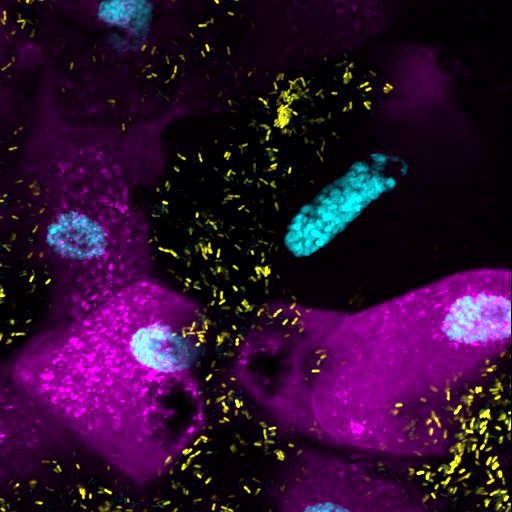Soutenance de Thèse : Théodore Grenier
| Quand ? |
Le 29/09/2021, de 02:00 à 05:00 |
|---|---|
| Où ? | Amphithéâtre SVT à l'ENS de Lyon |
| S'adresser à | Théodore Grenier |
| Participants |
Jury members: Rapporteurs : Pr. Irene Miguel-Aliaga et Pr. Jean-Marc Ghigo; Examinateurs : Dr. Samir Merabet et Dr. Nathalie Rolhion; Directeur de thèse : Dr. François Leulier. |
| Ajouter un événement au calendrier |
|

Le 29 septembre, Théodore Grenier de l'équipe de François Leulier soutiendra sa thèse intitulée :
"Mutualisme nutritionnel facultatif entre animal et bactéries : apport du modèle Drosophile-Lactobacillus plantarum"
Résumé :
La croissance juvénile dépend en grande partie de l’alimentation : en situation de sous-nutrition, le développement post-embryonnaire est ralenti. Le microbiote intestinal joue un rôle important dans ce lien entre nutrition et croissance. En effet, certaines bactéries symbiotiques peuvent améliorer la croissance de leur hôte en sous-nutrition. Dans notre laboratoire, nous cherchons à comprendre les mécanismes de promotion de la croissance par des bactéries symbiotiques en utilisant comme modèle la larve de Drosophile. Nous contrôlons sa nutrition grâce à un milieu nutritif synthétique et son microbiote en utilisant des Drosophiles axéniques (i.e. dépourvues de microbiote) que nous pouvons associer avec des bactéries symbiotiques bénéfiques pour la croissance, Acetobacter pomorum et Lactobacillus plantarum (récemment renommé Lactiplantibacillus plantarum). Nous avons tout d’abord testé l’influence de ces bactéries sur les besoins nutritionnels de leur hôte. En retirant chaque nutriment composant le milieu nutritif synthétique un à un, nous avons établi quels nutriments étaient nécessaires à la croissance des larves de Drosophile axéniques. Nous avons ensuite montré que A. pomorum et L. plantarum peuvent fournir certains de ces nutriments à leur hôte, ce qui lui permet de se développer sur un milieu nutritif carencé en ce nutriment.
De plus, nous avons découvert un autre mécanisme : L. plantarum améliore la croissance de son hôte en situation de déséquilibre lié au manque d’un acide aminé spécifique (la Valine), sans pour autant produire cet acide aminé.
Pour comprendre ce mécanisme, nous avons réalisé un crible génétique en utilisant une banque de mutants perte-de-fonction de L. plantarum. Cela nous a permis d’identifier des gènes essentiels à ce mécanisme. Nous nous sommes concentrés sur une famille de gènes candidats codant pour les ARN ribosomaux et les ARN de transfert. L. plantarum mutant pour ces gènes voit sa capacité d’améliorer la croissance de son hôte réduite. Nous avons ensuite cherché à comprendre comment les ARN bactériens peuvent impacter la croissance de leur hôte. Chez tous les,Eucaryotes, la kinase GCN2 permet l’adaptation au stress nutritionnel. GCN2 est activée par des ARN ribosomaux et des ARN de transfert non-chargés. En inhibant génétiquement GCN2 chez la Drosophile, nous avons montré que l’expression de GCN2 dans les cellules de l’intestin est nécessaire pour que L. plantarum puisse promouvoir la croissance larvaire en situation de déséquilibre en Valine. De plus, les larves associées à L. plantarum montrent une activation de GCN2 dans leur intestin, contrairement aux larves axéniques. Cette activation dépend en partie de la présence chez L. plantarum des gènes codant les ARNr et ARNt. Nous proposons donc que les ARNr et/ou ARNt de L. plantarum activent GCN2 dans les cellules de l’intestin de l’hôte, ce qui lui permet de s’adapter et de grandir de façon optimale sur un milieu déséquilibré en acides aminés. Nous avons réalisé une analyse transcriptomique de l’intestin de l’hôte dans différentes conditions, et nos résultats suggèrent que cette adaptation repose notamment sur le métabolisme de l’hormone stéroïdienne ecdysone.
Grâce à des approches complémentaires de génétique fonctionnelle chez l’hôte et la bactérie, nos travaux ont ainsi permis d’identifier de nouveaux mécanismes d’interactions entre hôte et microbes qui expliquent comment les bactéries symbiotiques améliorent la croissance de leur hôte en sous-nutrition.

Image confocale d'un intestin de larve de Drosophile. En cyan : les noyaux des cellules, en magenta : un rapporteur fluorescent pour l'activité de la protéine GCN2, en jaune : la bactérie Lactiplantibacillus plantarum.


